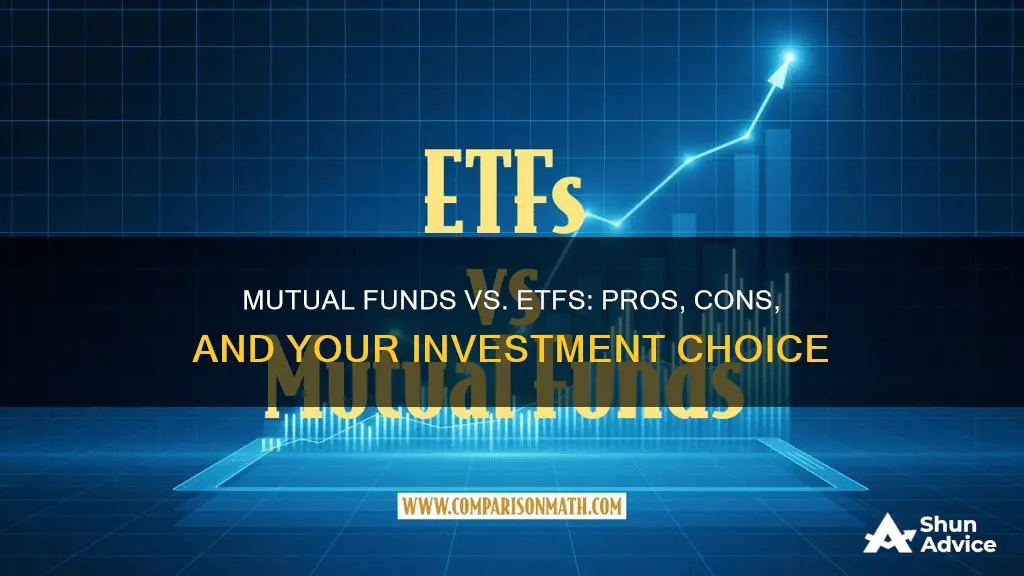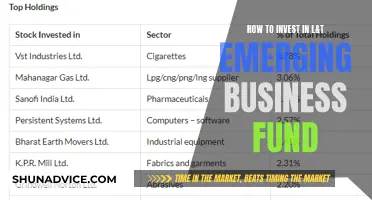
Exchange-traded funds (ETFs) and mutual funds are both managed baskets of individual securities, such as stocks and bonds, that offer exposure to a wide variety of asset classes and niche markets. They are both less risky than investing in individual stocks and bonds and are overseen by professional portfolio managers. However, there are some key differences between the two that investors should be aware of when deciding which option is best for their investment strategy.
| Characteristics | Values |
|---|---|
| How are they traded? | ETFs are traded like stocks and are bought and sold on a stock exchange throughout the day. Mutual funds are bought directly from investment companies and orders are executed once per day. |
| How are they managed? | Most ETFs are passively managed, tracking the performance of a particular index. Mutual funds are actively managed by fund managers. |
| What's the minimum investment? | ETFs do not require a minimum initial investment and are purchased as whole shares. Mutual funds have a minimum initial investment that is a flat dollar amount. |
| Costs | ETFs have explicit and implicit costs, including trading commissions, operating expense ratios, and bid/ask spreads. Mutual funds have expense ratios and may have sales loads or early redemption fees. |
| Tax efficiency | ETFs are more tax efficient than mutual funds as they generate fewer capital gains. |
| Control over price | ETFs provide more control over the price of trades. |
| Automatic investments | Mutual funds allow for automatic investments and withdrawals. |
What You'll Learn
- ETFs are exchange-traded, meaning they can be bought and sold intraday, whereas mutual funds can only be bought or sold once per day after the close of trading
- ETFs are often more tax-efficient than mutual funds because they generate fewer taxable events
- ETFs are more flexible than mutual funds as they can be traded like stocks
- Mutual funds can be purchased without trading commissions, but they may carry other fees
- ETFs are often cheaper to invest in as they have no minimum investment requirements beyond the price of one share

ETFs are exchange-traded, meaning they can be bought and sold intraday, whereas mutual funds can only be bought or sold once per day after the close of trading
Exchange-traded funds (ETFs) are bought and sold like common stocks on a stock exchange, meaning they can be traded throughout the day. This is in contrast to mutual funds, which are generally bought directly from investment companies and are executed only once per day, with all investors receiving the same price.
ETFs are traded on an exchange, and their prices fluctuate throughout the day as they are bought and sold. This means that the price at which you buy an ETF will likely differ from the prices paid by other investors. This is known as "intraday" pricing.
Mutual funds, on the other hand, are priced only at the end of the trading day. Regardless of the time of day an investor places a trade, they will receive the same price as everyone else who bought or sold that day. This price is calculated after the market closes and is known as the net asset value (NAV).
The ability to trade throughout the day gives investors more control over the price of their trades. With ETFs, investors can use more sophisticated order types, such as limit orders, stop orders, and stop-limit orders, to maximise profits and minimise losses.
The intraday trading of ETFs also offers greater liquidity and flexibility than mutual funds. Investors can get out of an ETF at any time during the trading day, which can be crucial if the market is falling.
However, it is important to note that not all ETFs are highly liquid. Some ETFs trade rarely or only at wide spreads, making it difficult to sell them.
In summary, ETFs offer the advantage of being exchange-traded, allowing investors to buy and sell throughout the day, providing more control over pricing and the ability to react to market changes. Mutual funds, on the other hand, are bought and sold only once per day at a single price, giving less flexibility but ensuring all investors receive the same price.
American Funds: Which Investment Companies to Look For?
You may want to see also

ETFs are often more tax-efficient than mutual funds because they generate fewer taxable events
Exchange-traded funds (ETFs) are often considered more tax-efficient than mutual funds because they generate fewer taxable events. This is due to the inherent structure of ETFs, which are ""exchange-traded", meaning they can be bought and sold intraday, like any other stock.
Mutual funds, on the other hand, can only be bought or sold once per day, after the close of trading. This is because mutual funds are typically bought directly from investment companies, rather than from other investors on an exchange. As a result, anyone who invests in a mutual fund on the same day will receive the same price.
ETFs, on the other hand, use "creation units" to accommodate investment inflows and outflows. Creation units are baskets of assets that approximate the entirety of the ETF's investment exposure. This means that investors are usually not exposed to capital gains on any individual security in the underlying structure, reducing the number of taxable events.
Additionally, the majority of ETFs are passively managed, which means they only change their holdings when the underlying index they track adds or removes new constituents. In contrast, mutual funds are actively managed, meaning their managers are constantly rebalancing the fund by selling securities to accommodate shareholder redemptions or to reallocate assets. These sales of securities within a mutual fund can trigger capital gains for shareholders, even if they have an unrealized loss on their overall investment.
The tax efficiency of ETFs can be particularly advantageous for investors in taxable accounts, as taxes are minimized for the holder of the ETF, resulting in a lower tax bill compared to a similarly structured mutual fund. However, it's important to note that certain types of ETFs, such as international or emerging market ETFs, may be less tax-efficient due to restrictions on in-kind deliveries of securities.
Overall, the reduced number of taxable events generated by ETFs can make them a more tax-efficient investment option compared to mutual funds.
Vanguard Funds: Ethical Investing and Weapons Manufacturers
You may want to see also

ETFs are more flexible than mutual funds as they can be traded like stocks
Exchange-traded funds (ETFs) and mutual funds are both professionally managed collections or "baskets" of individual stocks or bonds. They are both less risky than investing in individual stocks and bonds and offer a wide variety of investment options. However, there are some key differences between the two.
ETFs are traded on a stock exchange and experience price changes throughout the trading day. This means that the price at which you buy an ETF will likely differ from the prices paid by other investors. Mutual funds, on the other hand, are generally bought directly from investment companies instead of from other investors on an exchange. Orders are executed once per day, with everyone who invests on the same day receiving the same price. This makes ETFs more flexible than mutual funds as they can be traded like stocks.
With ETFs, you can buy and sell shares in an ETF on the open market with other investors. It's also possible to buy or redeem shares with the fund provider, but this is less common. Shares trade throughout the day, making ETFs a better choice for active traders. ETFs are also often cheaper to invest in, as mutual funds typically have minimum investment requirements of hundreds or thousands of dollars. You can invest in an ETF if you have enough money to buy a single share.
ETFs also have a tax advantage over mutual funds. By virtue of in-kind creations and redemptions, ETFs come with unrivalled tax magic. This creates a huge advantage for ETFs among investment strategies that kick off capital gains. The more funds trade, the more susceptible they are to selling winners and realizing capital gains. However, this tax advantage is most effective for stock funds.
In terms of transparency, most ETFs disclose their holdings every day, allowing investors to see what's inside their portfolios daily. In contrast, mutual funds are required to disclose their holdings only quarterly, with a 30-day lag.
Overall, ETFs are more flexible than mutual funds as they can be traded like stocks, offering investors greater control over their investments.
How to Choose the Right Managed Funds
You may want to see also

Mutual funds can be purchased without trading commissions, but they may carry other fees
Mutual funds are an attractive option for investors who want to avoid trading commissions. However, it's important to remember that they may carry other fees that can impact the overall performance of your investment. Here are some key points to consider:
No Trading Commissions: Mutual funds are typically bought directly from investment companies, rather than on a stock exchange like ETFs. This means that mutual funds don't attract trading commissions, making them a cost-effective option for investors.
Expense Ratio: While mutual funds may not have trading commissions, they do carry an expense ratio. This is a percentage of the fund's assets that are deducted annually to cover operating expenses. The expense ratio includes management fees and other ongoing expenses associated with running the fund. It's important to note that passively managed funds, such as index funds, usually have lower expense ratios than actively managed funds.
Sales Load: Some mutual funds charge a sales load or sales fee, which is similar to a commission. This fee is paid to the broker or intermediary when buying or selling shares in the fund. There are two types of sales loads: front-end loads, charged when you first buy shares, and back-end loads, charged if you sell your shares within a certain time frame. Sales loads can significantly impact your investment returns, so it's important to consider them when choosing a mutual fund.
Other Fees: In addition to the expense ratio and sales load, mutual funds may also have other fees. These can include 12b-1 fees, which are annual charges for distribution and marketing costs, and redemption fees, charged when you sell your shares. It's important to carefully review the fund's prospectus or offering document to understand all the fees associated with the investment.
Impact on Returns: The fees associated with mutual funds can have a significant impact on investment returns. Funds with high expense ratios and sales loads need to outperform their benchmark indices or similar funds to justify these fees. However, studies have shown that load funds often do not perform better than no-load funds. Therefore, investors should carefully consider the fee structure before investing in mutual funds.
Alternative Options: If you're concerned about the impact of fees on your investment returns, ETFs may be a more suitable option. ETFs often have lower expense ratios and don't usually carry sales loads. Additionally, some brokerage firms offer commission-free trading for ETFs, making them a cost-effective alternative to mutual funds.
Smart Ways to Invest $1000 in Mutual Funds
You may want to see also

ETFs are often cheaper to invest in as they have no minimum investment requirements beyond the price of one share
Exchange-traded funds (ETFs) are often cheaper to invest in than mutual funds as they have no minimum investment requirements beyond the price of one share. This means that investors can buy a single share of an ETF, whereas mutual funds often require a minimum investment of hundreds or thousands of dollars.
ETFs are bought and sold on a stock exchange, and their price is subject to change throughout the trading day. The price of one share of an ETF can be as little as $50 or a few hundred dollars, depending on the ETF. This flexibility makes ETFs a good option for investors who want to control the price of their trade.
On the other hand, mutual funds are generally bought directly from investment companies, and orders are executed once per day, meaning that all investors who buy or sell on the same day will receive the same price. Mutual funds usually have a flat dollar amount for their minimum initial investment, which is not based on the fund's share price. For example, most Vanguard mutual funds have a $3,000 minimum investment.
ETFs are also more tax-efficient than mutual funds. As they are passively managed, they generate fewer taxable events. ETFs may also be subject to lower costs as they are traded through a brokerage account, and record-keeping is handled by the brokerage firm.
Vanguard Funds: Gun Investments and Your Money
You may want to see also
Frequently asked questions
Mutual funds and ETFs are both managed "baskets" or pools of individual securities, such as stocks and bonds, that offer exposure to a wide variety of asset classes and niche markets. They are both overseen by professional portfolio managers and are less risky than investing in individual stocks and bonds.
Mutual funds are bought and sold directly from investment companies, whereas ETFs are traded on a stock exchange like stocks. Mutual funds are usually bought and sold once per day at the net asset value (NAV), while ETFs experience price changes throughout the trading day. Mutual funds often have higher minimum investment requirements than ETFs, which can be purchased for the price of a single share. Mutual funds are typically actively managed, while ETFs are passively managed and track a market index.
Mutual funds have been around for a longer period than ETFs and generally offer investors a greater variety of choices. They are also suitable for investors who want to make regular deposits and use dollar-cost averaging.
ETFs offer intraday liquidity, lower costs, greater transparency, tax efficiency, and greater flexibility. They are also suitable for investors who want more hands-on control over the price of their trades and those who want to repeat specific transactions automatically.
The choice between mutual funds and ETFs depends on your investment strategy, goals, and risk tolerance. Mutual funds may be preferable if you want to make regular deposits and use dollar-cost averaging, or if you are concerned about the impact of commissions and spreads. ETFs may be better if you prefer intraday trading, lower expense ratios, and greater tax efficiency.







